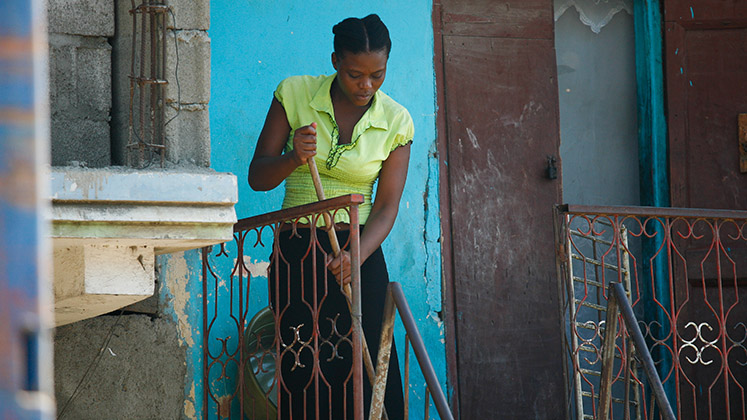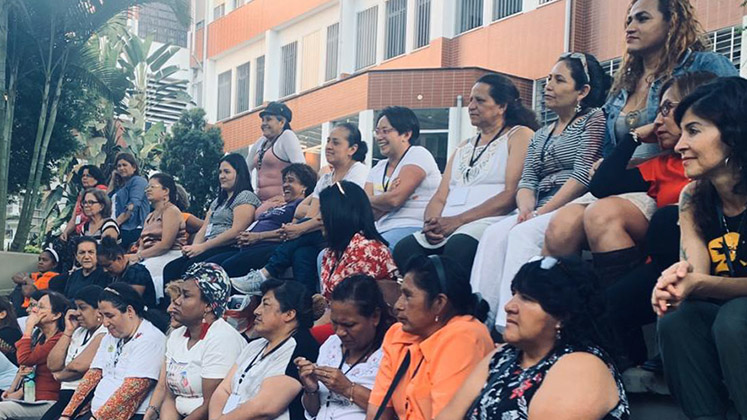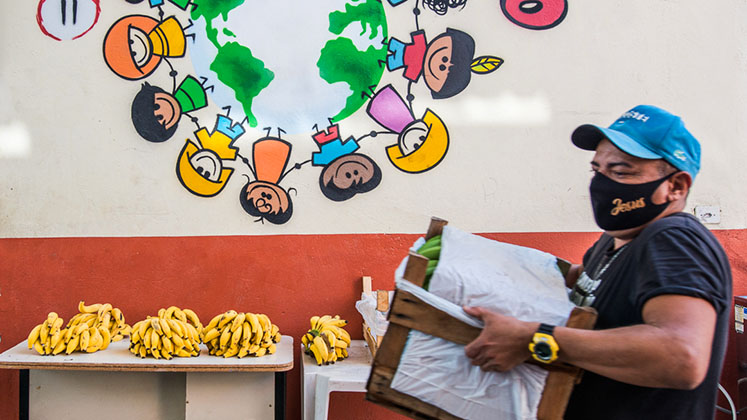
 Millions of Latin American women and girls work outside the home in caring jobs, but despite the best efforts of unions and activists, the extra risks they face due to the COVID crisis have been largely ignored, write Tallulah Lines (University of York) and Jean Grugel (University of York).
Millions of Latin American women and girls work outside the home in caring jobs, but despite the best efforts of unions and activists, the extra risks they face due to the COVID crisis have been largely ignored, write Tallulah Lines (University of York) and Jean Grugel (University of York).
In an effort to counter the devastating impact of social distancing policies, Latin American governments have introduced packages of emergency social policies, labour market support for those working in the formal economy, and cash transfer relief for those in the informal sector. Yet support for many groups of people, especially women, has fallen short.

Women and Latin America’s care economy during COVID-19
Regional organisations in Latin America are making the case for recognising the high burden of care that women are facing – with important differences between women – against the wider background of differential gendered impacts of the pandemic. These include the Organization of American States (OAS), the Economic Commission for Latin America and the Caribbean (ECLAC) and the Pan-American Health Organisation (PAHO).
But government responses still lag behind, and by the end of September 2020, six months after social distancing measures began, only ten Latin American states had between them implemented just 30 policies explicitly related to the care economy. Argentina tops the list with 12 policies, but the most common number is two. Several countries, including Brazil and most of Central America, appear not to have implemented any at all.
- Nine offer short-term, time-limited remuneration for those unable to work because of childcare responsibilities; extra remuneration for healthcare workers; and support for community-based responses.
- Eight provide some minimum legal protection for domestic workers.
- Seven allow exemptions from lockdown/confinement measures for caregivers.
- Five provide information or promotional campaigns that advocate for co-responsibility of caring between men and women.
Most are short-term, time-limited emergency responses. Six months on from their introduction, many women who provide care – including migrant women, domestic workers, impoverished women, and healthcare workers – do so without protection at precisely the moment when their need is greatest.
“One survived, the other did not”
The pandemic does not impact upon all women equally. Moreover, women and girls who are vulnerable in socioeconomic or policy-making contexts are not inherently vulnerable individuals, and many are active agents for change, even during the pandemic.
Despite paid domestic work “mak[ing] all other jobs possible, and guarantee[ing] the care and wellbeing of the most precious things we have: our loved ones and families”, paid domestic work is hugely undervalued. Domestic workers across Latin America face multi-layered discrimination and lack basic legal and social protection, particularly in countries which have still not ratified ILO Convention 189 on domestic work. Over three-quarters of domestic workers in Latin America are informal workers, without contracts or social security provision. COVID-19 exacerbates risks to jobs and health, leaving domestic workers exceptionally vulnerable to exploitation. Many have been fired without pay or redundancy packages.

Two examples in Brazil illustrate the risks that domestic workers in Latin America currently face.
Cleonice Gonçalves was one of the first people to die from COVID-19 in Brazil. This was “not by coincidence”, argues Louisa Acciari, but the result of inequality, racism, and structural discrimination:
Cleonice Gonçalves [was] a black woman, aged 63, diabetic, [living] in the city of Miguel Pereira in the state of Rio de Janeiro. Her employer, a resident of the upper-class area of Leblon, had just returned from a trip to Italy and did not inform her employee that she had been contaminated. One survived, the other did not.
Another early casualty was five-year-old Miguel Otávio Santana da Silva, a black boy who was accompanying his mother to work due to national school closures. He died after being left alone by his mother’s employer, incidentally the wife of a politician, who has since been released on bail. Miguel’s mother has commented: “If it was the other way round, I wouldn’t be [bailed], because I’m poor.”
Domestic workers’ activism and mutual support
Domestic workers’ unions and activist organisations in Latin America were thriving long before COVID-19, and during the pandemic they are continuing to promote domestic workers’ rights through campaigning and direct action.
In Mexico, national and local unions are supporting those domestic workers who have been fired without salary or the redundancy pay to which they are legally entitled, as well as those who have been forced to continue working, do extra hours without pay, or work without adequate safety protection. Marcelina Bautista, the founder of the country’s first national domestic workers’ union, has demanded better protection for domestic workers during the pandemic. And feminist collectives have provided food and other necessities to women in need, including domestic workers.

In Brazil, the national domestic workers union FENATRAD launched a campaign demanding both adequate protection for domestic workers who had to continue to work and also paid leave for those who could not. It received parliamentary backing. The union also supports domestic workers with practical support such as guidelines on protecting themselves from the virus and negotiating with employers on COVID-19 related pay and conditions, supporting them in claiming emergency state benefits to which they are entitled, and distributing food baskets to unemployed domestic workers.
Elsewhere, in Guatemala, the ATRAHDOM union has led efforts to support domestic workers and other low-income women in situations of risk. Aside from providing basic food and hygiene supplies and PPE, they have organised digital cash transfers and members seeking to gain access to basic health coverage.
Keeping domestic work on the agenda
It is domestic workers’ activism, along with that of their allies in academic and policy-making circles, which has ensured that paid domestic work remains on the agenda at national and regional level. They have used their organisational strength to fight for fairer working conditions and state protection during the crisis. The existence of the eight policies that we outline above, which offer at least some protection to domestic workers, is testament to their efforts. But much more is needed.
The example of domestic work is one of the clearest ways that we can see the difference of experience between women during the COVID-19 pandemic. Differences in social class, ethnicity, race, dis/ability, migrant status, rurality, and age all feature in relationships between who cares and who is cared for. While regional organisations are beginning to recognise the importance of these differences, it is not always so clear in national-level discussions about women and COVID-19, and much less so in policy. Instead, we still find women treated as a homogeneously vulnerable group. Stronger intersectional and intercultural policies are essential if we are to better empower and support the most vulnerable women.
Better policies are also needed to address the needs of girl domestic workers. We still do not know even how many girls work as domestic workers in Latin America, and so we know little about their experiences, whether before or during the pandemic. Furthermore, most of the literature on care and COVID-19 focuses on the extra burden of care for those who are caring. This is indeed important, but policies are also needed to empower those who are cared for.
Finally, the burden of care for domestic workers does not stop when they go home from their jobs. They also have caring responsibilities in their own homes, and, as domestic worker unions and other women’s organisations show, often it is domestic workers who take on the responsibility of caring for their co-workers in the absence of structural, state support. We need to acknowledge how multi-faceted care is, and why it is essential that it is valued as a fundamental part of the productive economy, with responsibilities shared between families, individuals, the state and community.
Notes:
• The views expressed here are of the authors rather than the Centre or the LSE
• This is a lightly edited version of an article first published by LSE COVID-19
• Please read our Comments Policy before commenting





